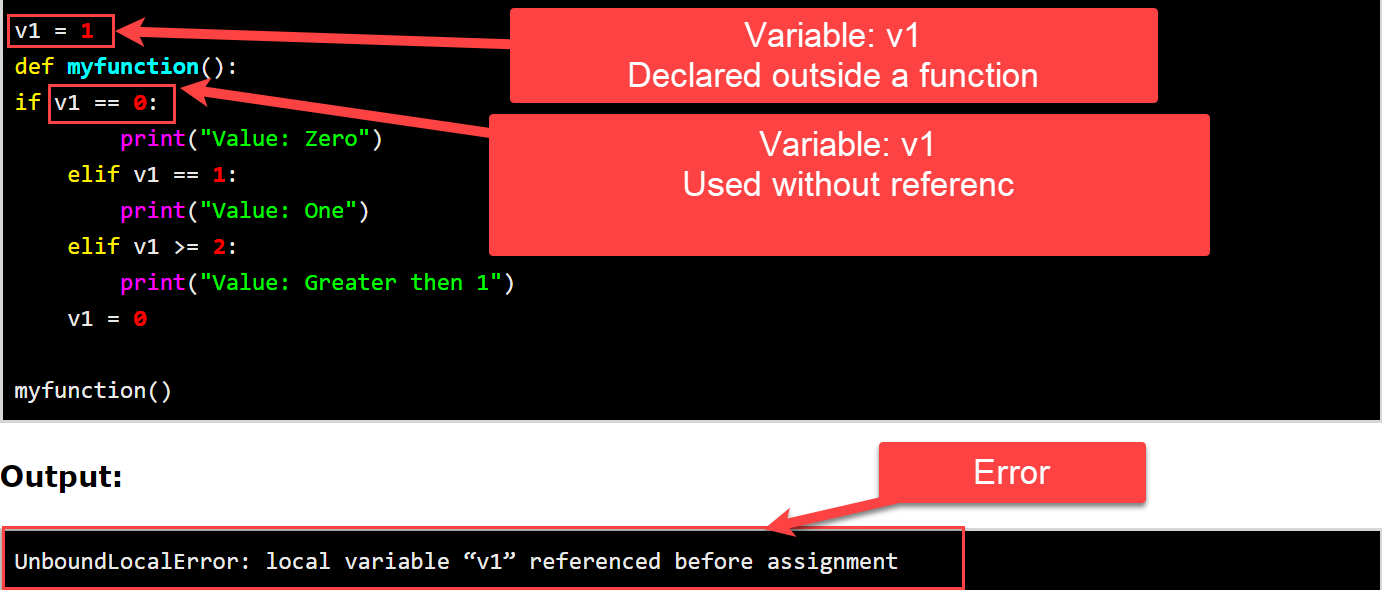The “local variable referenced before assignment” error occurs when you give reference of a local variable without assigning any value.

Example:
v1 = 1
def myfunction():
if v1 == 0:
print("Value: Zero")
elif v1 == 1:
print("Value: One")
elif v1 >= 2:
print("Value: Greater then 1")
v1 = 0
myfunction()
Output:
UnboundLocalError: local variable “v1” referenced before assignment
Explanation:
In the above example, we have given the value of variable “v1” in two places.
- Outside the function “myfunction()”.
- And at the end of the function “myfunction()”.
If we assign a value of a variable in the function it becomes local variable to that function, but in the above example we have assigned the value to “v1” variable at the end of the function and we are referring this variable before assigning.
And the variable“v1” which we have assigned at the beginning of the code block is not declared as a global variable.
Solutions:
To avoid an error like “UnboundLocalError: local variable referenced before assignment” to occur, we have to:
- Declare GLOBAL variable
- Pass parameters with the function
Declare Global Variable
Code example with global variable:
v1 = 1
def myfunction():
global v1
if v1 == 0:
print("Value: Zero")
elif v1 == 1:
print("Value: One")
elif v1 >= 2:
print("Value: Greater then 1")
myfunction()
Output:
Value: One
Explanation:
As we know if we declare any variable as global then its scope becomes global.
Pass function with Parameters
Code example passing parameters with function:
def myfunction(v1):
if v1 == 0:
print("Value: Zero")
elif v1 == 1:
print("Value: One")
elif v1 >= 2:
print("Value: Greater then 1")
myfunction(10)
Output:
Value: Greater then 1
Explanation:
In the above example, as you can see, we are not using a global variable but passing the value of variable “v1” as a parameter with the function “myfunction()”.
Example 2
def dayweek(day):
if day == 7 or day == 6 or day == 0:
wd = 'Weekend'
elif day >= 1 and day <= 5:
wd = 'Weekday'
return wd
print(dayweek(10))
Output:
UnboundLocalError: local variable 'wd' referenced before assignment
Example 2.1
def dayweek(day):
if day == 7 or day == 6 or day == 0:
wd = 'Weekend'
elif day >= 1 and day <= 5:
wd = 'Weekday'
return wd
print(dayweek(1))
Output:
Weekday
In the "example2", we have called a function “dayweek()” with parameter value “10” which gives the error but the same function with value “1” which runs properly in “example 2.1” and returns the output as “Weekday”.
Because in the above function we are assigning the value to variable “wd” if the value of variable "day" is the range from (0 to 7). If the value of variable "day" greater than "7" or lower then "0" we are not assigning any value to variable "wd" That's why, whenever the parameter is greater than 7 or less than 0, python compiler throws the error “UnboundLocalError: local variable 'wd' referenced before assignment”
To avoid such type of error you need assign the function variable which lies within the range or we need to assign some value like "Invalid Value" to variable "wd" if the value of variable "day" is not in range from (0 to 7)
Correct Example with Exception
def dayweek(day):
if day == 7 or day == 6 or day == 0:
wd = 'Weekend'
elif day >= 1 and day <= 5:
wd = 'Weekday'
else:
wd = 'Invalid Value'
return wd
print(dayweek(22))